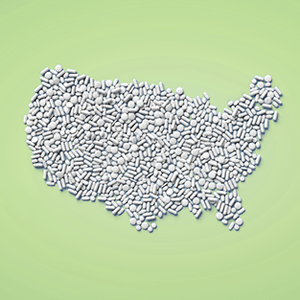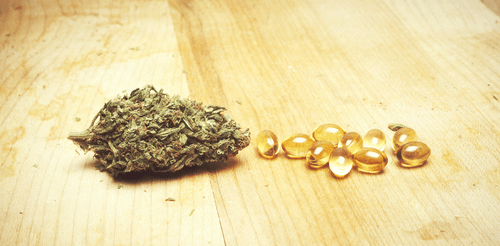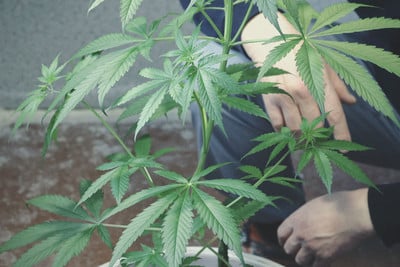.

Big Pharma's Profits Shrink As Patients Turn To Cannabis.
Deaths and addictions to painkillers and antidepressants became a public health problem in USA and Canada. Now patients are turning to medical cannabis to treat their conditions without risks and severe adverse effects. A new study was published, and Big Pharma don't like it.
Medical cannabis can provide effective treatments for pain and many serious diseases. A new study just gave evidence American patients are turning to cannabis trying to quit painkillers. The large amount of patients now choosing cannabis derivatives instead of opioids or other synthetic drugs is probably bothering some solid pharmaceutical company.
David and Ashley Bradford work as researchers at the University of Georgia, USA. They recently published a study in the journal Health Affairs indicating Americans are consuming less painkillers, opioids and other harmful drugs in the States where medical cannabis is legal. The study was then mentioned by several newspapers and media also because in the US and Canada the painkiller’s epidemic has become a serious threat to public health.
The scientists collected relevant information from the database of prescription drugs paid by Medicare from 2010 to 2013. Medicare is the public healthcare service in the USA for people older than 65, or younger and suffering of certain conditions. The aggregated data showed that in the 17 American states where a cannabis regulation was in force, prescriptions for painkillers and other drugs fell sharply compared with states which are still deprived of a medical cannabis law.
 BIG PHARMA SEEMED TO WELCOME THE MASSIVE ADDICTION TO PAINKILLERS AND ANTIDEPRESSANTS IN USA
BIG PHARMA SEEMED TO WELCOME THE MASSIVE ADDICTION TO PAINKILLERS AND ANTIDEPRESSANTS IN USA
The pharmaceutical industry has always been lobbying against cannabis. Over the last years, the pharma lobby held pressure on the DEA and other authorities in order to limit as much as possible the conditions and the number of patients able to qualify for medical cannabis. They were pretty good at protecting their profits, even when the consequence of their business was a large population addicted to painkillers, antidepressants and mood-changing legal pills.
Beside Big Pharma greed, pain and chronic pain are hard to fight without using drugs causing serious adverse effects and a physical dependency. Prescription painkillers such as opiates are highly addictive and they can be deadly: in the USA they killed about 16.000 patients in 2013 and the number increased to 25.000 in 2015. An estimated 2 million people are somehow addicted to these kinds of medications. Painkillers business is huge, just as much as the psychotropic legal drugs market, both of them easily addressed by medical cannabis, according to a lot of scientific studies.
FACTS AND FIGURES ON PATIENTS MOVING TO MEDICAL CANNABIS
According to Bradfords’research, the number of Americans quitting or reducing painkillers, antidepressants and other drugs was impressive in States with medical cannabis regulations: a single average doctor prescribed 265 fewer doses of antidepressants for each one of these last years, and 562 fewer doses of anti-anxiety drugs. The same typical physician prescribed 486 fewer doses of drugs against seizures, and 541 fewer anti-nausea. What shocked most the public opinion was our average family doctor prescribing 1.826 fewer doses of painkillers in one single year.
This study showed clear evidence that the number of some controlled Medicare prescriptions was drastically reduced where patients were free to choose cannabis derivatives in order to deal with their conditions. The most common diseases treated with cannabis and mentioned in this study were anxiety, depression, pain and chronic pain, nausea, seizures and spasticity, sleep disorders, addictions to substances. Among the positive results of the cannabis normalization in North America, we might also see a reduction in the use and abuse of dangerous medicines and hard drugs, like heroin and alcohol.
After just a few years of cannabis legalization experiments in USA, it looks like this reform led immediately to different prescriptions habits: a large number of patients is choosing the natural therapeutic effects of cannabis plant against the severe, sometimes lethal, side effects of synthetic drugs. Also, cannabis is cheaper than many of the patented pharmaceuticals it can replace. Some Big Pharma might not like it.
PHARMACEUTICAL COMPANIES LOSE SOME PROFITS, PATIENTS GAIN INDEPENDENCE
Therapeutic cannabis use by American patients was able to reduce Medicare costs by 165 million of dollars in 2013. When all the North American States will have effective medical cannabis laws in force, public healthcare savings will count for about 470 million each year. Unfortunately, this might happen just because Medicare will not pay for medical cannabis, as it does not today. Patients have to pay for their cannabis medicine, while many dangerous prescription drugs are subsidized by federal government through Medicare.
Despite this unfair public healthcare regime, shared by many countries, this new research on prescriptions habits adds a lot of evidence about patients choosing cannabis over painkillers, opioids or other drugs, regardless the costs they have to bear. This happens as soon as patients feel that cannabinoids can effectively replace or integrate other prescriptions, especially the most dangerous ones.
Obviously, the Drug Enforcement Administration (DEA) must now consider reclassifying cannabis from a Schedule I substance to a Schedule II at a federal level. This would mean in the next future medical cannabis might be supported by Medicare for certain conditions. If cannabis was reclassified, also private insurance companies would cover the expenses for their patients. This money flow is not passing through traditional pharmaceutical companies anymore, and almost 500 million dollars will be vaporised from the Big Pharma money box every given year.

THE RELATIONS BETWEEN DOCTOR AND PATIENT MIGHT CHANGE A LITTLE
After many years of big money made with painkillers and various kinds of psychotropic drugs, Big Pharma might start experiencing a little reduction in their incomes from pain management and feel-good pills sales. Cannabis is now also challenging the scientific healthcare decision models just by placing some decisions, and sometimes medicine production itself, in the patients’ hands and consciousness. Physicians are used to prescribe precise doses of standard drugs. With medical cannabis they have to evolve their methods, since a full control of a patient’s cannabinoid intake is hard to obtain, and patients will be able to choose among different varieties and cannabis derivatives in order to better suit their specific therapeutic needs.








































